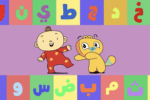5 Facts For Parents Who Want To Raise Bilingual Kids
These days, it is very common for parents to teach their children both Arabic and English, simultaneously. Although Arabic might be our mother tongue, it is a difficult language to learn and we need to put more effort into establishing a strong Arabic language base for our children.
Raising bilingual children is challenging, but it is proven that exposure to a second language strengthens cognitive abilities, and brings intellectual, cultural, and practical benefits from childhood and beyond.
Children will gain life skills from being bilingual such as a more focused attention span, and the ability to multi-task, and will tend to be more creative and flexible.
Here are some facts you should know about raising bilingual children:
1. Language exposure has to be person-to-person
Want your kids to learn Arabic? Experts state in order to foster language development, exposure to the language has to be focused person-to-person. Although videos and songs aid in strengthening their vocabulary, you must put in the one-on-one work with your children, and the other educational aids should be considered secondary.
Speak to your children in their non-dominant language (the one they are weaker in) more often, you can even have one dedicated family member speak to the children in one language only.
2. Read out loud with your children daily
The importance of reading to your children is one of the most valuable ways to expose them to new vocabulary and words they may not otherwise hear. Instill a love for reading in your children. It is one of the best things you can do for their future. Stock up on your children’s favorite book titles in both Arabic and English, and read to them daily. Consistency is key when it comes to reading.
3. Raising bilingual children requires a lot of exposure
You should expose your children to both languages, with a focus on the language they are weaker in. You can do this by singing, talking, playing and more. Melodies help children memorize words and phrases that they usually would not be able to, while also expanding their vocabulary and having fun!
Exposing them to the target language out of the home is also important, you can do this by spending time with family and friends, while making sure to also give them a heads up so they can support you and speak the target language exclusively around your children.
4. Offer some screen time in the target language
Make use of the limited screen time your children have daily to your advantage, and let your children watch programs and play games in their non-dominant language to expose them more while keeping it fun for them. Children learn best when they are having fun!
5. Be playful with your children
Playful parenting approaches are very beneficial in language learning, playing lightens the mood, cultivates respect, and grabs the right type of attention while also sending a message to your children.



